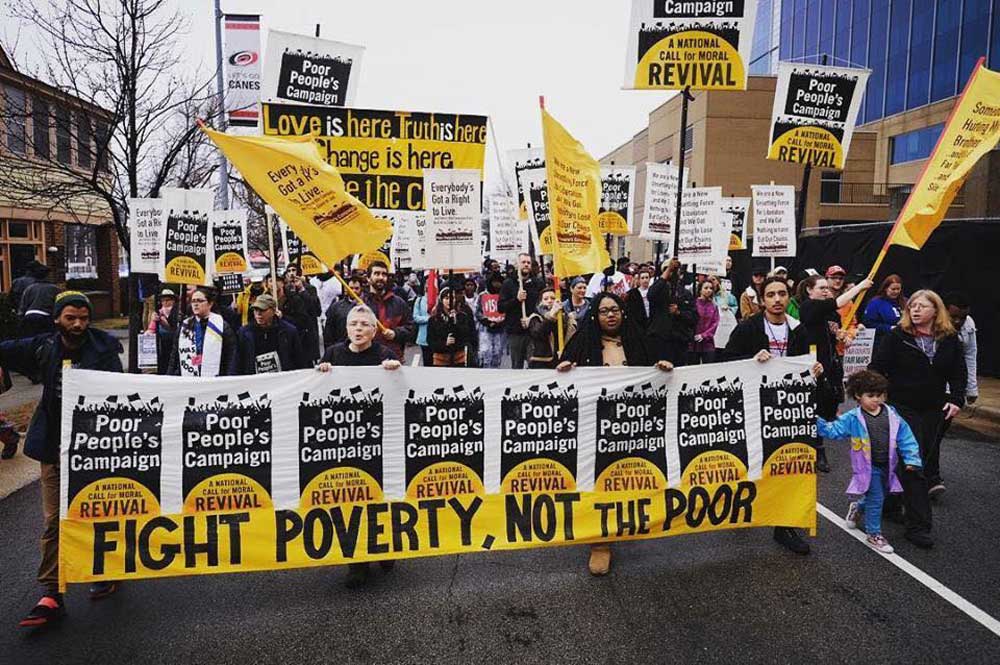Fifty years after Dr. Martin Luther King Jr. envisioned a mass movement for economic equality, activists are working to reignite the flame of the movement.
Last month, a new iteration of the 1968 Poor People’s Campaign began a six-week period of national activism. Demonstrators in more than 30 states and D.C. met in their capitals on Feb. 5 to call for equality. The campaign went on to partner with grassroots organizers to lead a march in Marks, Mississippi, the town that, 50 years ago, inspired Martin Luther King Jr. to call for a Poor People’s Campaign when he witnessed the poverty the town’s residents suffered. The modern movement joined with striking fast-food workers to push for a $15-an-hour minimum wage.
Rev. Dr. Liz Theoharis and Rev. Dr. William J. Barber II are leading the campaign to build on MLK’s work to unite the poor and seek justice and equality for disenfranchised and marginalized people. Meetings have been held in cities across the country since late 2017. In the new year, they began to lead nonviolent protests, such as the minimum-wage march in Mississippi.
On Feb. 19, the campaign held a meeting at Shiloh Baptist Church in Washington, D.C., to discuss public action through testimonies and speeches by local community members. Activists, organizers and religious leaders of diverse backgrounds from D.C., Maryland, and Virginia attended. Theoharis was there in person, while Barber sent a video message that was played for the audience.
D.C.’s poverty and homelessness rates, as well as its proximity to lawmakers, makes it an important location for the campaign, according to Theoharis.
“We want to really highlight, both as a nation’s capital and as a place with rampant poverty and racism, that the people are coming together and calling for this campaign,” she said. “A lot of the issues that are affecting people all over the country are particularly pronounced in our nation’s capital.”
The attendees discussed systemic racism, environmental and ecological hazards, and an economic system that promotes war — insofar as they affect marginalized groups in D.C. “Until we shift the narrative, until we are able to talk about these issues and come up with solutions to these problems, no real change can happen,” Theoharis said.

Rev. Terence Mayo, of Shiloh Baptist Church, spoke about income inequality in D.C. According to a study published in 2017, the median family income in Ward 7 between 2006-2010 and 2010-2015 went from $34,562 to $31,273, a nearly 10 percent drop, while the median income in Ward 2 increased by almost 65 percent.
“As the median income continues to rise in certain wards in D.C., it continues to decline in others,” Mayo said. “The disparity we see continues to widen day by day.”
He asked the audience to take action as a collective group against oppression and injustice in the District.
“Tonight we name the sins of poverty,” Mayo said. “Tonight we call for a moral revolution of values to set us back on the path to equality of all people. Tonight we welcome you here to resist the systems that have been put in place to keep us marginalized and divided.”
His words echoed the mission statement of the new campaign, officially named Poor People’s Campaign: A National Call for Moral Revival.
While 2016 legislation put D.C. on track to have a $15 minimum wage by 2020, inequality and lower wages have been a struggle for many District residents.
Over the past decade, there has been an increase in the numbers of African Americans leaving the District, as the number of white people moving into the District has increased, according to a study published by Maurice Jackson, an associate professor of history at Georgetown University and first chair of the D.C. Commission on African American Affairs.
This migration is due to lack of jobs, a housing crisis and poor educational attainment, according to Jackson. “So many people were leaving because no one was paying attention to them,” he said in an interview.
According to the study, the annual median income for a white D.C. family is $120,000, while it is $41,000 for Black families.
Jackson said his study illustrates the social and economic issues that African Americans face in the District, and further demonstrates why there is a need for a Poor People’s Campaign in D.C.
“What startled me was the absolute neglect of people in need,” he said. “I knew it was bad. I didn’t know it was this bad.”
The new Poor People’s Campaign plans to tour the country in 2018, visiting places such as Flint and Detroit, Michigan, where residents face issues from contaminated water to a housing crisis. The organizers will continue to meet with local activists and grassroots leaders to push towards the end of racial and economic injustices, according to Theoharis.
“We’ve been really inspired by the 1968 Poor People’s Campaign that Dr. King planned for … to finish some of the unfinished business that was left undone from about 50 years ago,” she said.









